Islam in the Luhansk Region
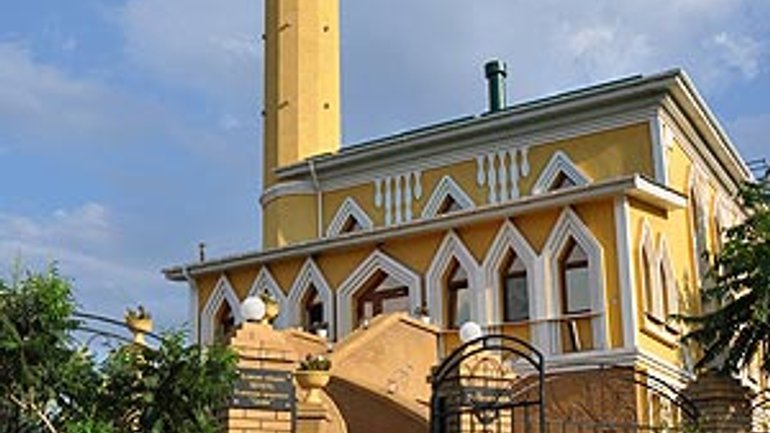
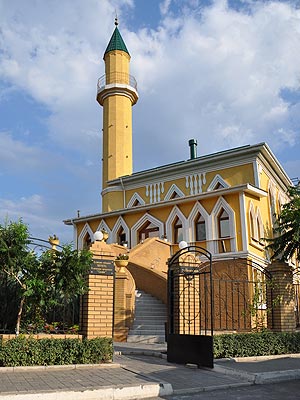 The holy month of Ramadan is coming to an end for Muslims around the world and August 8 is an important religious holiday – Eid al-Fitr. It is good occasion to meet with representatives of the Muslim community in Luhansk and talk about the life of the Muslim believers in this region of Ukraine, is it not?
The holy month of Ramadan is coming to an end for Muslims around the world and August 8 is an important religious holiday – Eid al-Fitr. It is good occasion to meet with representatives of the Muslim community in Luhansk and talk about the life of the Muslim believers in this region of Ukraine, is it not?
To learn about how Muslims in Luhansk live, I spoke with the imam of the mosque in Luhansk, Muhammad Al-Ustaz, and head of the religious organization Salam and assistant professor at the Volodymyr Dahl East Ukrainian National University, Seyfulla Rashidov.
Mosque in Luhansk Built Conjointly
The mosque in Luhansk is very young. It appeared thanks to a group of devoted Muslims led by Seyfulla Rashidov. assistant professor of pedagogy at the Volodymyr Dahl East Ukrainian National University, It was on his initiative that on April 14, 1999, the religious organization Salam was founded in Luhansk.
“We began to think about a mosque in the 1990s, when the interest in religion was growing in the society. However, we were faced with the problems of combining our traditional faith and life in a non-Muslim environment. How, given the natural needs and respecting all traditions, can we bury our faithful, hold marriage ceremonies...” said Seyfulla Rashidov.
The Luhansk mosque is surrounded on one side by a ravine, and on the other by a shelterbelt, so to people who pass by, it seems that it is secluded in a dense forest. But those who come close to it are surprised by what they see. “When we were trying to obtain a building permit, we specifically looked for such a place – a place that is quiet, calm, and peaceful,” said Rashidov.
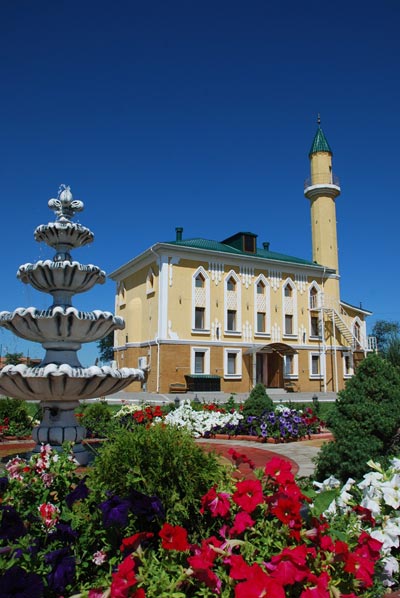
In 2005, according to a decision of the Luhansk City Council, land for the construction of the mosque was allocated, and two years later, on the basis of a draft design of one of the mosques in Crimea, construction began.
The building was constructed with the help of donations. Construction was completed in 2010, and on May 29 the mosque was officially opened. About a thousand guests attended the ceremony. The guests were greeted magnificently: on the first day alone 800 kilograms of pilaf were prepared and the festive table was almost 50 meters in length.
“You know, in Islam it is not accepted to advertise whose money was used to build a mosque. We are equally grateful to all those who helped in the construction” says Rashidov.
Today the building of the Luhansk mosque is a three-story building with a total area of 550 square meters. The height of the minaret is 25 meters. A gym and a kitchen are located on the ground floor, a library, classroom, and office are located on the second floor. The third floor is divided into two parts: the lower part is a prayer room for men, and the upper part is for women.
“Earlier this place was a wasteland that led into the ravine, and now it has a beautiful building. In the surrounding area we planted trees and flowers, installed a shaded gazebo and benches, so that it would be comfortable not only inside but also outside,” says Rashidov.
But for Muslims in Luhansk, the mosque is not just a beautiful architectural structure with domes and a minaret. Here everyone can find privacy, find refuge from the noise, reflect, talk to the Almighty.
“A mosque is a house of Allah, a place to calm the soul and heart of a Muslim,” says Rashidov.
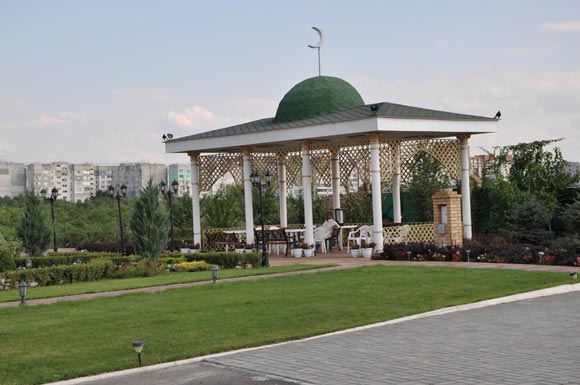
Luhansk Imam Has Academic Degree
Like any religious building, the Luhansk mosque begins with spiritual leader. The imam of the mosque, Muhammad Al-Ustaz, manages the religious affairs of the mosque with his assistant Ildar Mutyhullin. The imam is in the mosque every day – praying, preaching, interpreting to the faithful the Holy Koran, conducting ceremonies, and advising on personal matters.
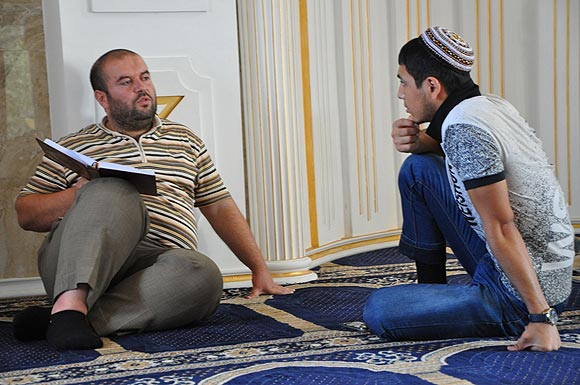
“People come with different issues: how to pray, how to perform Namaz. Working with people is not easy, but the hardest part for me is the burial ritual, accompanying a person to his final resting place. I very much empathize with him, because I do not know where this man will go. You ask God, pray, that he go to heaven. While a person is alive, you can steer him down the right path, give him advice, the person’s behavior can be improved, because he has time,” says the imam.
Muhammad Al-Ustaz was born in Gaza, Palestine, into a large religious family: his mother was a housewife and his father worked as a driver and a teacher of driving.
“Ever since childhood I had the desire to devote myself to God and become a mentor. I applied to the University of Gaza to the Faculty of Sharia and Law. But I didn’t have the opportunity to learn. At the request of my father, in 1994 I came to Ukraine to Zaporizhia to study medicine. I graduated from the medical university as a physician and then defended my PhD in physiology,” he says.
However, the idea of becoming a preacher never left Muhammad. As a medical student, he enrolled in a shariah course at the International Union of Muslim Scholars in Egypt.
“I studied to be doctor, and at the same time through Internet correspondence courses I attained a spiritual education. In 2008, I became an imam, began to preach Islam, and then I was sent to work in Luhansk,” says the imam.
The last time Muhammad Al-Ustaz was in his native Palestine was in 2000. “There is the Internet, so I can communicate with my family via Skype every day. Of course, I would like to visit home more often, but it is not possible. But my wife goes there every two years,” said the imam.
Despite his longing for his homeland, Muhammad intends to continue its work in Luhansk.
“We have no such practice that first an imam is appointed in one place, later transferred to another, and then another ... If people are emotionally connected with the imam, rely on him, then it is difficult to leave. The same goes for the imam. I am connected morally with the Muslims in Luhansk,” shared Mohammed Al-Ustaz.
Guests Are Always Welcome at the Mosque
According to unofficial data, in the Luhansk region there are about 25,000-30,000 ethnic Muslims, while the regional center is home to about 10,000. At this time, Muslims from nearly 30 different countries come to pray at the Luhansk mosque. These are immigrants from Africa, India, Afghanistan, Pakistan, and the former Soviet Union, especially North Caucasian peoples, Chechens, Dagestanis, Azerbaijanis, Uzbeks...
“They are intellectuals, civil servants, businessmen – all kinds of people. A lot of our parishioners are young – the children of local Muslims and foreign students who attend university in Luhansk,” says Seyfulla Rashidov.
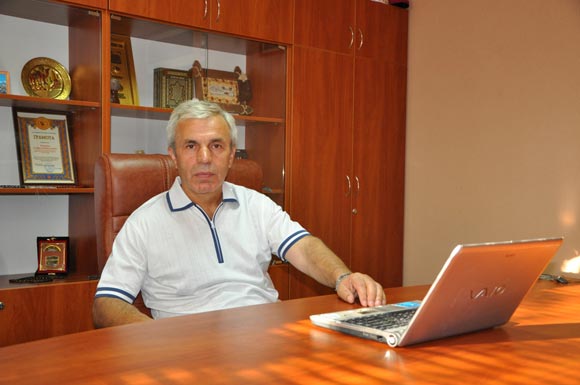
However, the Luhansk mosque is not just a structure to hold services; it is also spiritual, cultural, and educational center.
“The mosque is not only a place of prayer. We have a women's club, a library, and children and students come here to learn – here they are taught the rules of Islamic ethics, rules of prayer. In addition, members of the Muslim community study Arabic, and specialists give lectures on Islamic culture,” says Rashidov.
Guests often visit the mosque – representatives of other faiths and ethnicities, including students and schoolchildren, various foreign delegations, and interested people. As noted by Seyfulla Rashydov, the Luhansk mosque is one of the most visited in Ukraine, excluding some mosques in the Crimea. Guests are always welcome at the mosque.
“Islam does not divide people according to their nationality, we are open to all. It is a superstition that women are not allowed, that other religions are not allowed. This is the house of God, and its door is always open,” he said.
“We Want to Dispel the Myths and False Stereotypes”
Among Christians it is a widespread belief that Islam is a militant religion. However, according to Seyfulla Rashidov, Islam is a religion that teaches people to be obedient to God, his orders and prohibitions, solidarity and mutual aid.
“Islam is almost 1,500 years old. Of course, during this time there were many conflicts, many wars, both within the Islamic world and the Islamic world with the outside. But we are not talking about today. The Koran clearly states that killing one person is equivalent to killing humanity. All sorts of things that we see on TV, shouting ‘Allahu Akbar’ have nothing to do with Islam. These are wild, uneducated people who have virtually no knowledge of religion. This is politics, a lot of money, a fight for power. I do not mean that in Islam there are no problems, there are, as everywhere else (the same with America and its wars), but for some reason people believe that Muslims are terrorists. We want to dispel the myths and false stereotypes,” he says.
Another common stereotype is that a woman in Islam is completely devoid of rights. However, in reality, says Seyfulla Rashidov, the position of Muslim women is not as depressing as one might think.
“The Koran teaches: Men are guardians of women. In Islamic culture men’s dominance is evident. He is the breadwinner, he spends more. The primary role of women is to the family. But if a woman has the desire, she can receive an education and work. But not in such occupations that are harmful to a woman’s honor. Moreover, even after a divorce, the man is supposed to support his wife until she is settled.
“The Koran teaches: Paradise lies under the feet of your mother. A man must feed and protect women – his mother, sister, daughter. So judge for yourself how woman should be treated according to Islam. I myself am Dagestani, married to a Christian, and not one time when I visited my homeland did any of my relatives or friends badger me,” he said.
Seyfulla Rashidov said that contrary to the thought that only unfaithful wives are punished, Islam calls for the same punishment for unfaithful men as well. Also, in Islam one is not forced to marry only a Muslim, as well as one is not forced to accept Islam. “’There is no compulsion in the religion,’ it says in the Koran.”
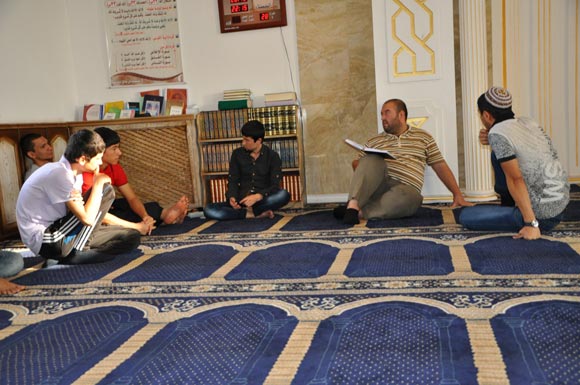
Preserving their Culture and Faith
As for xenophobic manifestations, according to Seyfulla Rashidov, fortunately, there have been none.
“Sometimes there is some writing on the walls or fences, but as for harassment...there is none! We believe that Muslims live in Luhansk very comfortably. And in general, in Ukraine proponents of Islam live quite comfortably, especially in the Donbas. At one time, American political scientists liked to talk about the region as a ‘melting pot’ with a lot of peoples, nationalities, and religions. Representatives of various denominations are tolerant and respectful. The authorities and society treat us well, but we do not break any laws, we live quietly,” Rashidov stressed.
“The Ukrainian people are easygoing and friendly,” in turn said Imam Muhammad Al-Ustaz.
“One time some people from Gorky Library came on a tour here. They looked around. And as they were leaving, they shared their impressions: ‘When we came to the mosque, we were a bit intimidated, and now as we leave, we are glowing,’” adds Seyfulla Rashidov.
Of course, living in a foreign country is associated with certain difficulties in terms of preserving the native culture.
“On the one hand, preserving one’s culture is easy, and on the other, it is difficult. It depends on education, religious knowledge, and upbringing. Many people, especially foreign students, cannot withstand the pressure of globalization. It sometimes happens that someone comes from a place like Dagestan and during his first month here he visits the mosque, but then disappears. Through the power of belief we can do nothing. Whenever possible, we find ways to influence – through family members, the community... Then, you see, they come for the holidays. This is the main role of our mosque: it helps people who are far from home to stay in touch with their homeland, it is a spiritual center,” summed up Seyfulla Rashidov.
Life today is hard to imagine without the World Wide Web. “The Internet in the era of globalization is a tool to unite,” said Rashidov.
The religious organization Salam has a website salam.lg.ua, which provides information on the activities of the Luhansk Muslim community, on events held in the Luhansk mosque, and on the activities of Salam. It also has religious materials such as books and lists prayers times.
Prepared by Diana Steshenko,
photos by the author









